

Top grossing international dating sites - excellent idea
Dangerous Liaisons: is everyone doing it online?

Main Findings
- As many as one-in-three people are dating online
- People turn to online dating for a variety of reasons – 48% do it for fun, while some look for more meaningful relationships and one-in-ten are simply looking for sex (13%)
- People share information with others too easily when they are dating online, with a quarter (25%) admitting they share their full name publicly on their dating profile. One-in-ten have shared their home address, and the same number have shared naked photos of themselves this way, exposing them to risk
- Even though lying is one of the most hated aspects of online dating, 57% of online daters lie to each other, faking a range of attributes such as their names, marital status, location and appearance
- People are concerned for their safety when they date online, with some of the main concerns involving worries about IT security – for example, 63% are concerned about the device they use for online dating becoming infected and 61% are concerned about their data being stolen or leaked from the dating app or service itself
- These concerns are well-founded – 55% have experienced some form of threat or problem while dating online. And, people that use online dating are twice as likely to experience an IT security incident than people that don’t (41% vs 20%), primarily due to their increased level of online activity in general
- Protection is also an issue for people that indulge in online dating. Just 27% of online daters use a security solution to protect their device and 16% do nothing at all to protect themselves as they see no risk
Introduction
Digital technology, especially smart devices, have transformed many aspects of our society, including how people meet each other and establish relationships – romantic or otherwise.
Attitudes towards dating apps and services have grown progressively more positive in recent years. Testament to this fact, when Pew Research Centre first questioned Americans about online dating in 2005, just 44% said the activity is a good way to meet people, and the majority thought it was a poor replacement for striking up relationships in the ‘real’ world. But the way we communicate, meet and express our love has changed dramatically since then, and when Pew Research Centre repeated the study ten years later, the number that considered online dating to be a good way of meeting people had grown to 59%.
How we conduct our relationships is changing, and it’s clear that technology has a key part to play in this change. People are now not only turning to their devices to work, shop, and play, but to manage their personal lives and relationships too.
Online dating is becoming more popular. But with concerns rife following incidents such as the infamous Ashley Madison breach, and with the process inherently requiring users to share personal information, it’s important to consider the potential dangers involved. Are online daters giving away too much about themselves? Are they, through online dating, exposing themselves and their devices to malicious people – or indeed malware – all too easily?
To understand the topic better and to help users protect themselves when they are dating online, Kaspersky Lab has undertaken a study into people’s online dating habits. The following report summarises our findings.
Methodology
An online survey conducted by research firm B2B International and Kaspersky Lab in August 2017 assessed the attitudes of 21,081 users aged over 16 years old from 32 countries.
This report outlines the responses of 6,458 online dating users from 30 of the countries surveyed (answers from respondents in China and the UAE have been excluded) regarding their online activity, including the types of devices they use, the kind of information they share, and any concerns they might have about online dating apps and services.
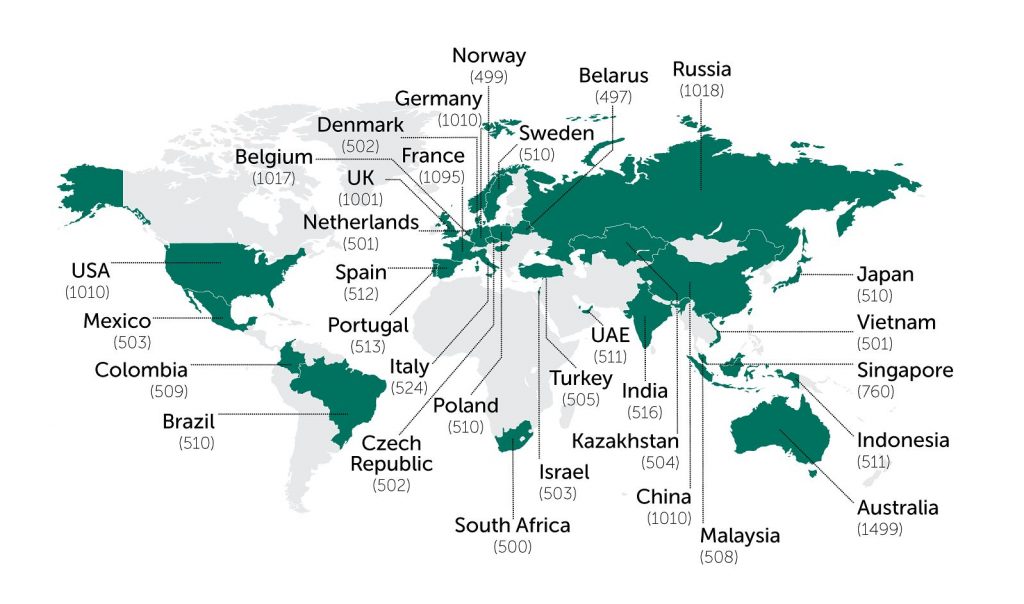
Data was weighted to be globally representative and consistent, split equally between men and women, and not all the results from the study have been included in this report. To request further data please contact Kaspersky Lab at prhq@kaspersky.com.
Look around. Someone near you is dating online
Online dating provides users with the ideal place to meet people that have similar likes, dislikes and character traits to them. It improves the chances of a user actually liking the person they’re going to meet on a date (because they can search for people that meet certain criteria), and, if you believe the online dating services themselves, an increasing number of people are also now finding lasting and meaningful relationships online. Considering all of this, perhaps it’s no surprise our study found that as many as 32% of Internet users are dating online.
So, if one-in-three people out there are doing it, who is the typical online dater?
Although such a large number of people are dating online, our study has found that if you decide to take part, you are most likely to be in the company of users that meet the following criteria.
People that date online are most likely to be:
- 33.8 years old on average
- Working full-time (63%)
- Slightly more likely to be male than female (39% of men date online vs 25% of women)
- Device-savvy – they have around 5 mobile devices compared to the usual 3 per household
- They are most likely to work as medium-level managers (20%) or be highly qualified specialists such as scientific workers, teachers and engineers (19%)
Many people that are on the online dating scene are young, as the 33.8 average age suggests, with 43% of 25-34 year olds using online dating services. This tech-savvy age group is likely embracing online dating as a way to meet interesting new people while balancing busy professional lives.
Meanwhile, people that class themselves as the head of a company or business owners make up a surprisingly large one-in-ten (11%) of the online dating population. Interestingly, we also found that 31% of people that are married or living with a partner are using online dating.
Online daters are most likely to visit dating apps and services from Windows PCs and Android smartphones than any other type of device. And, 51% of online daters admit to using a device that they use for work to carry out their online dating activities, despite the fact that they may be putting confidential corporate data at risk by doing so.
A pocket-sized relationship?
So why are these people going online to start up relationships with others? Certainly, online dating provides all the convenience of making it quick and easy to meet people. Plus, it’s an activity that’s available across multiple devices, at all times of day and night.
Our study asked people why they turn to online dating and while half (48%) said they mostly use online dating for fun, other reasons were also evident, with some saying they are looking for more meaningful relationships, and around one-in-ten simply looking for sex (13%).
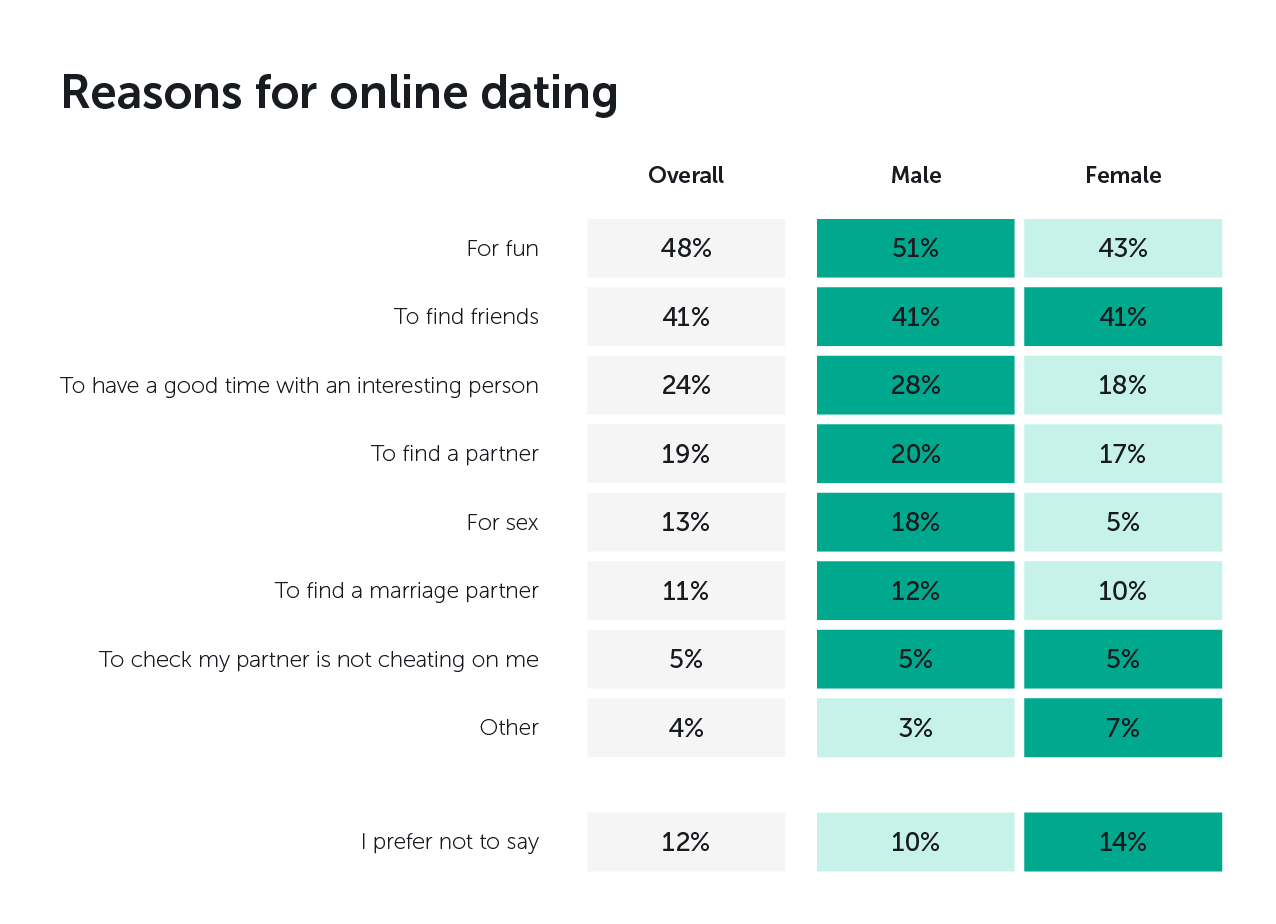
These findings suggest that there is still a degree of cynicism around the success of online dating, with people being twice as likely to look for ‘fun’ online, than love (a partner). However, with so many people turning to online dating for such a variety of reasons, it’s clear that the activity is literally allowing people to carry their relationships around with them wherever they go.
Gender differences also come into play. For example, men are much more likely than women to use online dating for sex (18% vs 5%), whereas men and women are equally as likely to be looking for new friends.
What people get up to when they’re dating online
While many different types of people go online to date – and they do it for multiple reasons, our study also asked people about what they get up to when they are dating online, in order to understand the potential security implications.
It’s all in the profile
The profile is understandably a crucial part of online dating. It allows users to share snippets of their lives. It acts as a window, or a preview of a person, enticing others to reach out to them or find out more.
Is the profile crucial to the success of online dating? Yes. But is profile information secure? No. We found that a worrying number of online dating users are, through their profiles, placing sensitive information about themselves into the public domain, which could potentially lead them to harm if the information was to fall into the wrong hands.
For example, one-in-ten online dating users have shared their full home address publicly on their profile, have shared details about their work/ trade secrets, or personal details about their family in this way.
Many share photos of themselves or their loved ones this way – 15% using online dating have shared photos of their family publicly by displaying them on their profile and 17% have shared photos of their friends. Even more worryingly, one-in-ten (9%) have even shared intimate photos of themselves publicly on their profile, literally exposing themselves to the danger of having their precious or sensitive images mistreated by total strangers.
Matching up to danger
People tend to share their information even more willingly with matches and it doesn’t take long for online daters to be persuaded to part with personal information about themselves, such as their home address or phone number.
People are more likely to give up information to those they have been ‘matched’ with in the online dating world – 16% give out personal details to matches, 15% tell matches embarrassing things about themselves and 14% provide their matches with private or unclothed photos of themselves. All of this information, in the wrong hands, can be used to track online dating users and their families online and offline, to crack their accounts by guessing passwords, for blackmail, and more. What’s more, this risky sharing happens faster than you might expect.
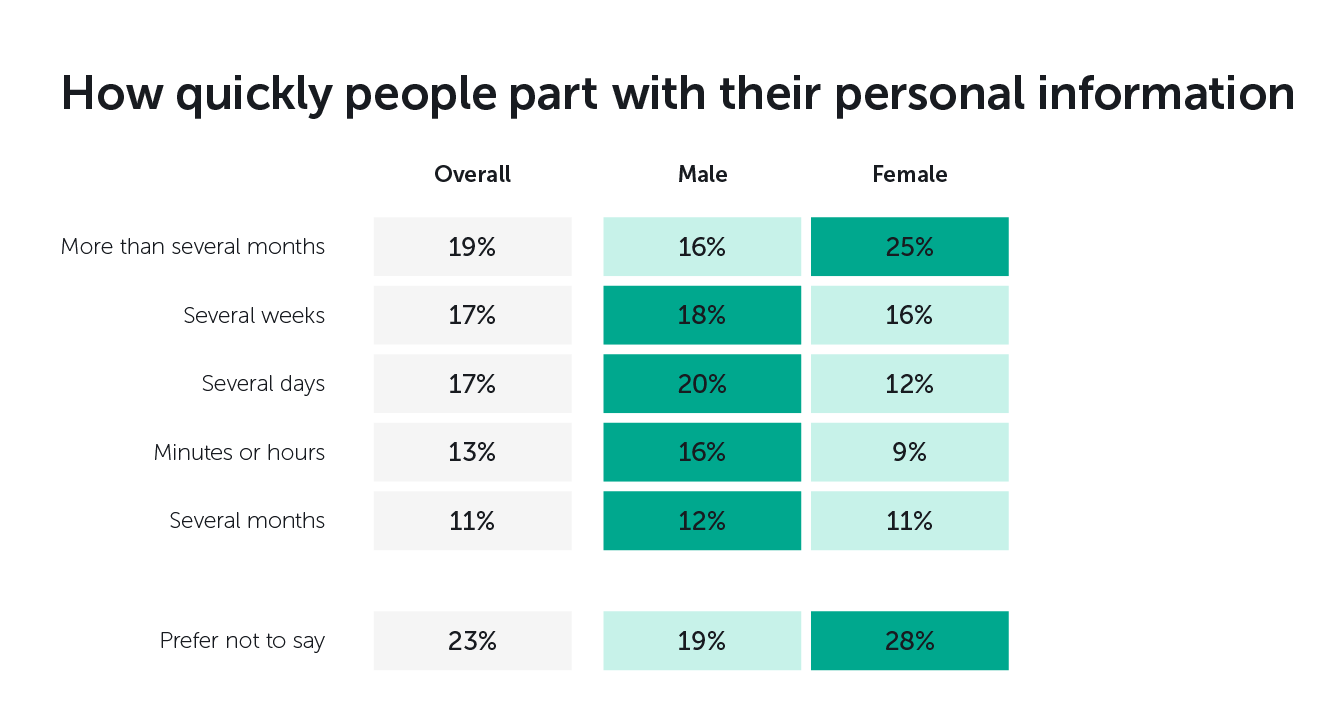
Giving out this information can mean that a relationship struck up online can enter the real world very quickly – with people going from being strangers, to being able to access an online dater’s home address or phoneline within a matter of minutes. That, of course, is not always a safe or a good thing.
However, there is a disparity between men and women. When it comes to personal information, men are ready to share information about themselves much faster than women are. Female users are likely to share information after several months (25% vs 16%), while men are significantly more likely to hand over their personal details after just minutes or hours (16% vs 9%).
Turn-offs
Despite the high proportion of people who use online dating services or apps, there are several factors that can put users off.
For example, one-in-ten users overall are worried about receiving malicious links or malware that infects their device and 9% are being put off by scammers that try to extort information or financial details from them. In both cases, entrepreneurs and self-employed online daters are the most worried about these threats, with 12% of this group worried about malware and 15% concerned about scammers.
Overall, 9% are also put off online dating by people who send overly private or unclothed images, and 7% are put off the activity when the information they share on dating services is used by others to harm them in some way. But coming across fake information – such as false photos (19%), fake relationship expectations (12%) and dishonest relationship statuses (11%) – was cited by respondents as the most common reason people are put off online dating services overall.
Faking it
People might turn to online dating for fun and to strike up new relationships, but ironically our study shows that a large number of people lie in the process, and this in itself is off-putting. 57% of online daters admitted they lie, most of whom (67%) turned out to be married men.
Among those that admitted they lie during online dating, the most popular things to lie about include their names, marital status, location and appearance – such as by showing fake photos. Yet, those who ‘fake it’ are ironically the most likely to be put off online dating because of the amount of false information they come across. Perhaps they don’t enjoy a taste of their own medicine? Either way, people faking it is one of the most hated aspects of online dating.
So, why are people lying online? Our study offers up many reasons including one-in-ten online daters (11%) using fake accounts as a way to protect themselves from harm. But other reasons vary from people trying to catch their partners cheating, to trying to make themselves look better, or simply lying for the fun of it.
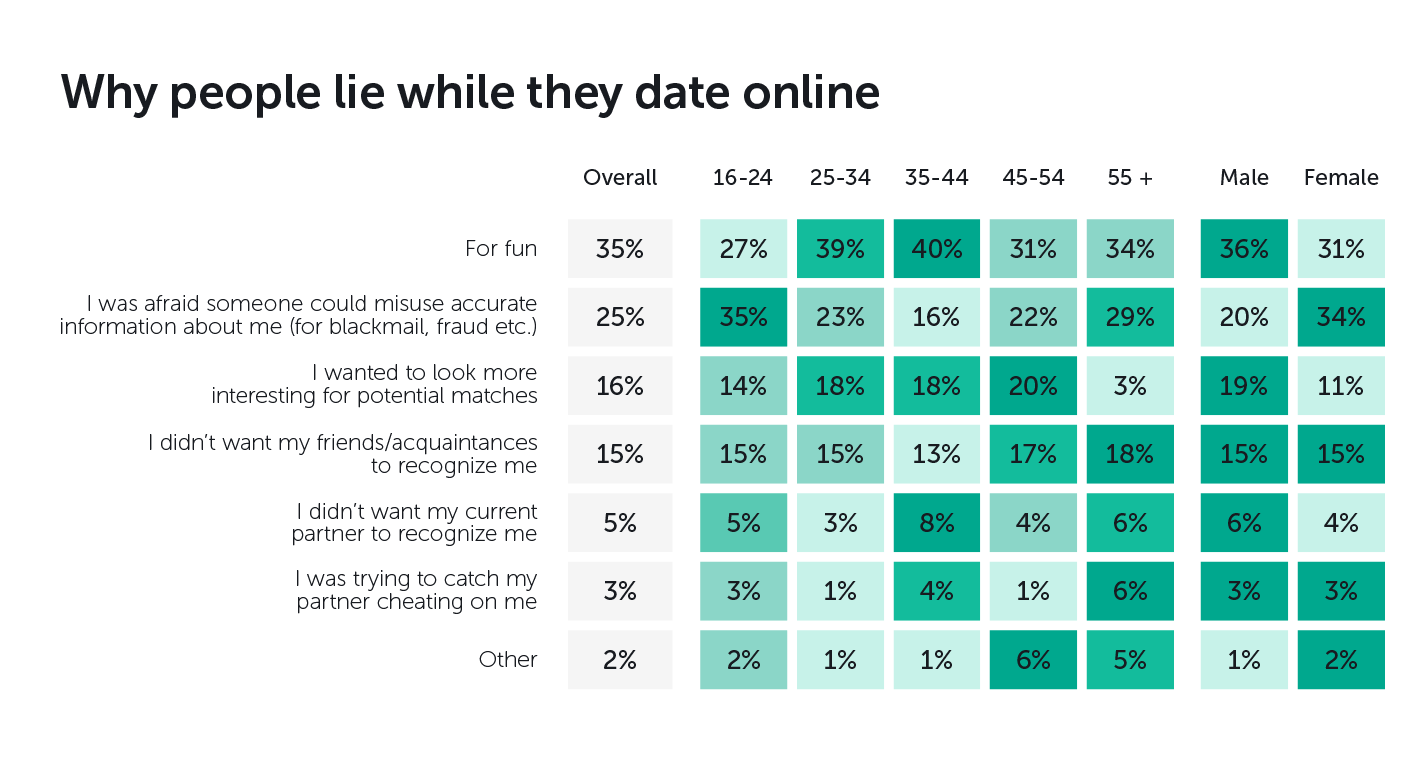
Safety first. People’s concerns about dating online
With people lying for a variety of reasons online, safety, naturally, becomes something that we should question. You wouldn’t trust a stranger in the street who lies to you about themselves, so why should you let them into your digital life, or give them access to sensitive information about yourself?
With online dating so prevalent, users are clearly giving strangers access to their lives, which could perhaps be why those who date online have concerns about their online safety.
We found that vulnerable people such as the unemployed, and unmarried women, tend to be most concerned about meeting ‘people with bad intentions’ through their online dating activities. Meanwhile, older age groups have slightly different concerns. 45-54 year olds, for example, tend to be concerned about the possibility of not being able to delete their information from online dating sites, and people aged 65+ are more concerned about fraud.
Overall though, some of the main concerns about dating online involve worries about data protection, with 61% of users being worried about their data being leaked from the dating service/app itself.
In addition, 63% are concerned about the device they use for online dating being infected by malware, demonstrating a heightened feeling of insecurity among the online dating community.
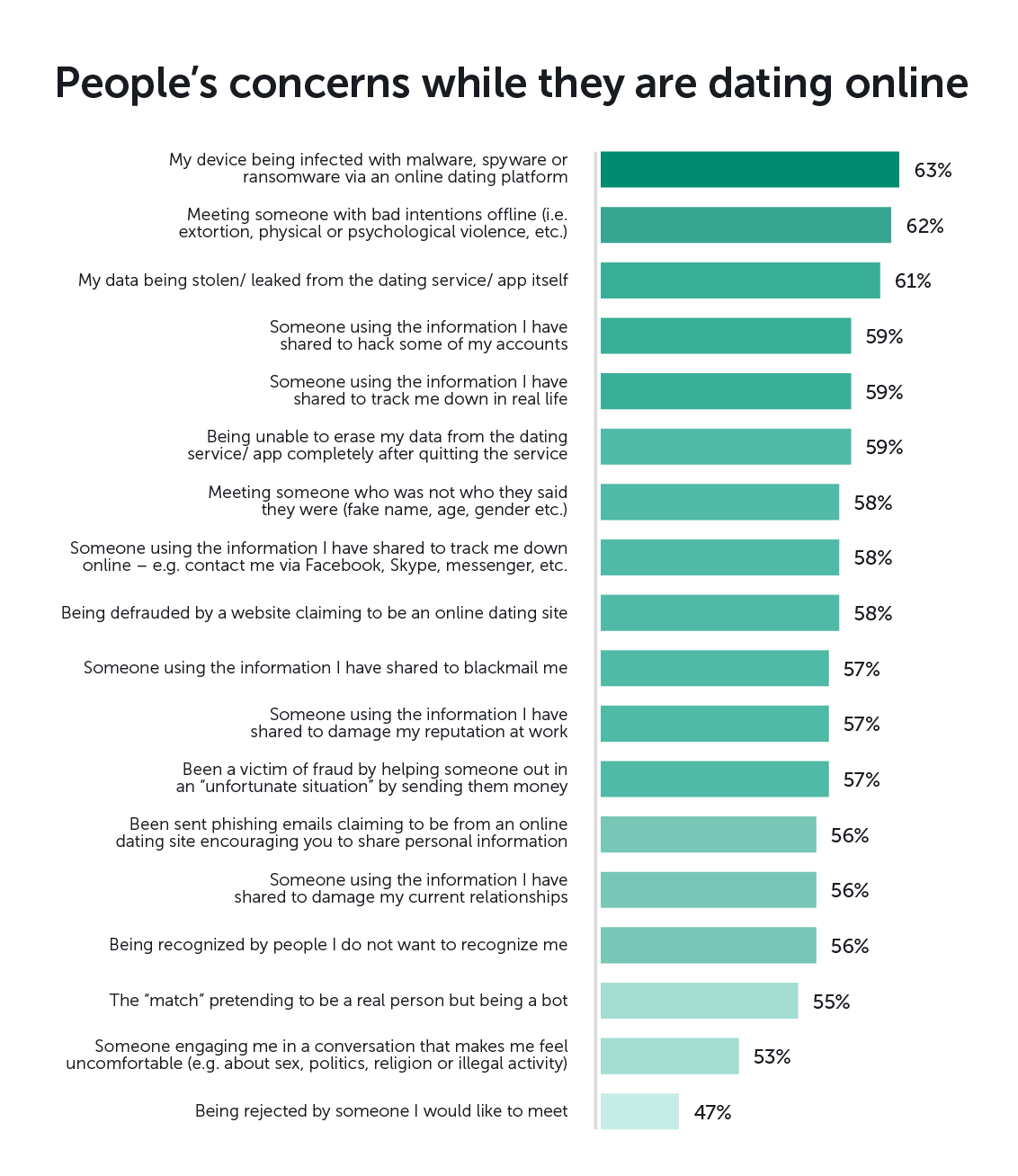
When it all goes wrong
Sometimes, people’s concerns about online dating do become a reality. After all, online dating, just like dating in the real-world, doesn’t always go to plan, and it can hurt when this happens.
Overall, 55% of people that date online have experienced some form of threat or problem – ranging from IT security incidents to meeting up with people that didn’t turn out to be who they claimed, or being rejected by potential matches.
The data suggests that men put themselves at risk more than women. Twice as many male online daters said their device has been infected with malware, spyware or ransomware and 13% of men had been sent phishing emails that claimed to be from an online dating site, compared to just 7% of women.
In contrast, 15% of women said they had been involved in a conversation that made them feel uncomfortable compared to just 10% of men.
When it comes to occupations, business owners (19%) were the most likely to have had their device infected with malware or ransomware, while entrepreneurs or self-employed daters were most likely to have met someone who was not who they said they were.
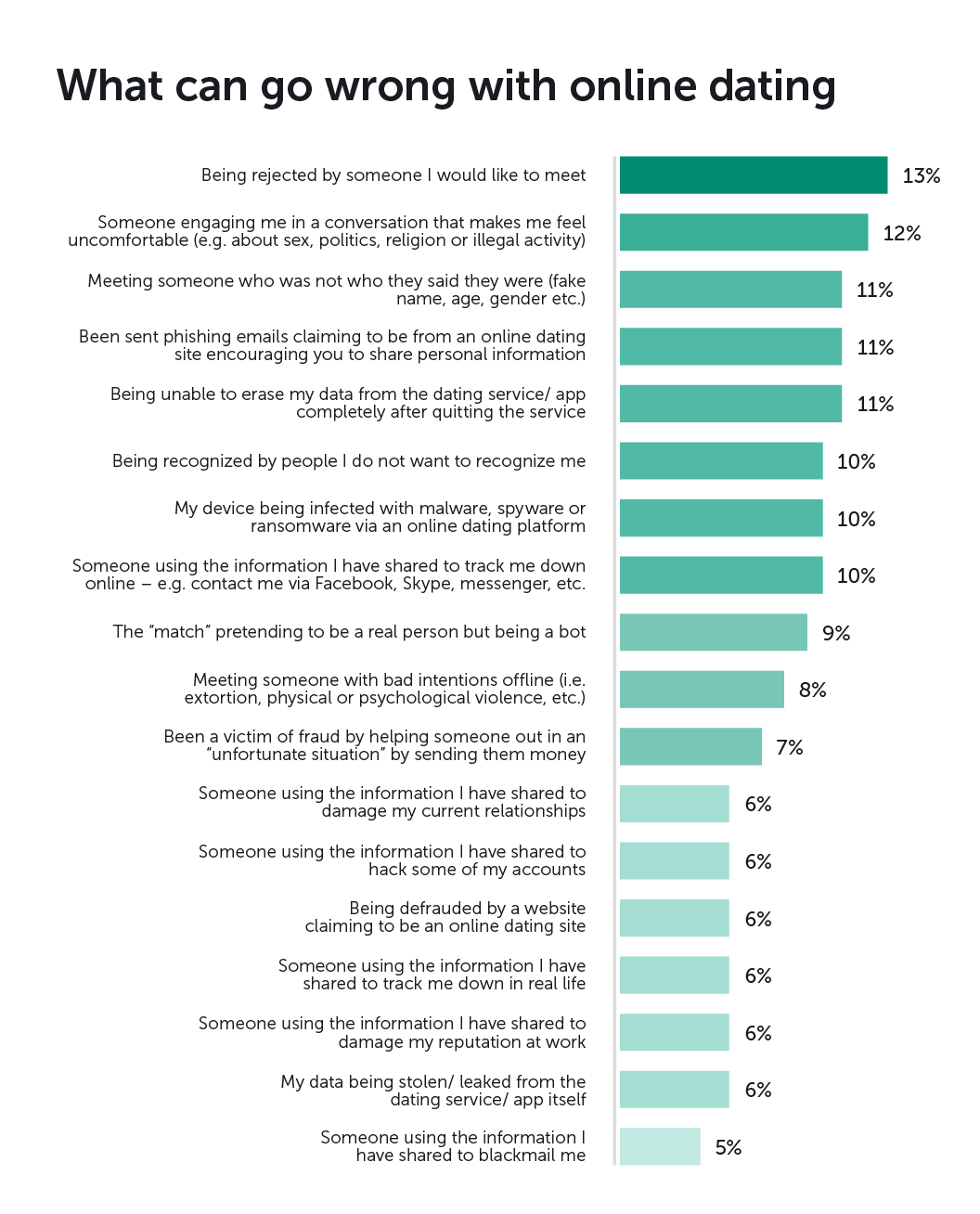
People that date online also tend to conduct a higher proportion of other activities on the Internet, making them particularly vulnerable to the dangers of the online world – as well as to the ‘usual’ risks of dating or arranging to meet up with people they don’t know or trust. This is perhaps one of the reasons why people that use online dating websites are therefore twice as likely to experience an IT security incident than people that don’t (41% compared to 20%).
Looking in more detail at the IT security incidents experienced by people that date online, there’s a wide range of things that can go wrong. For example, around one-in-three people that use online dating have had their device infected with malware or a virus compared to just 12% who don’t use online dating. In addition, around one-in-ten have had their device hacked, have had their data infected, shared, or become the victim of financial fraud.
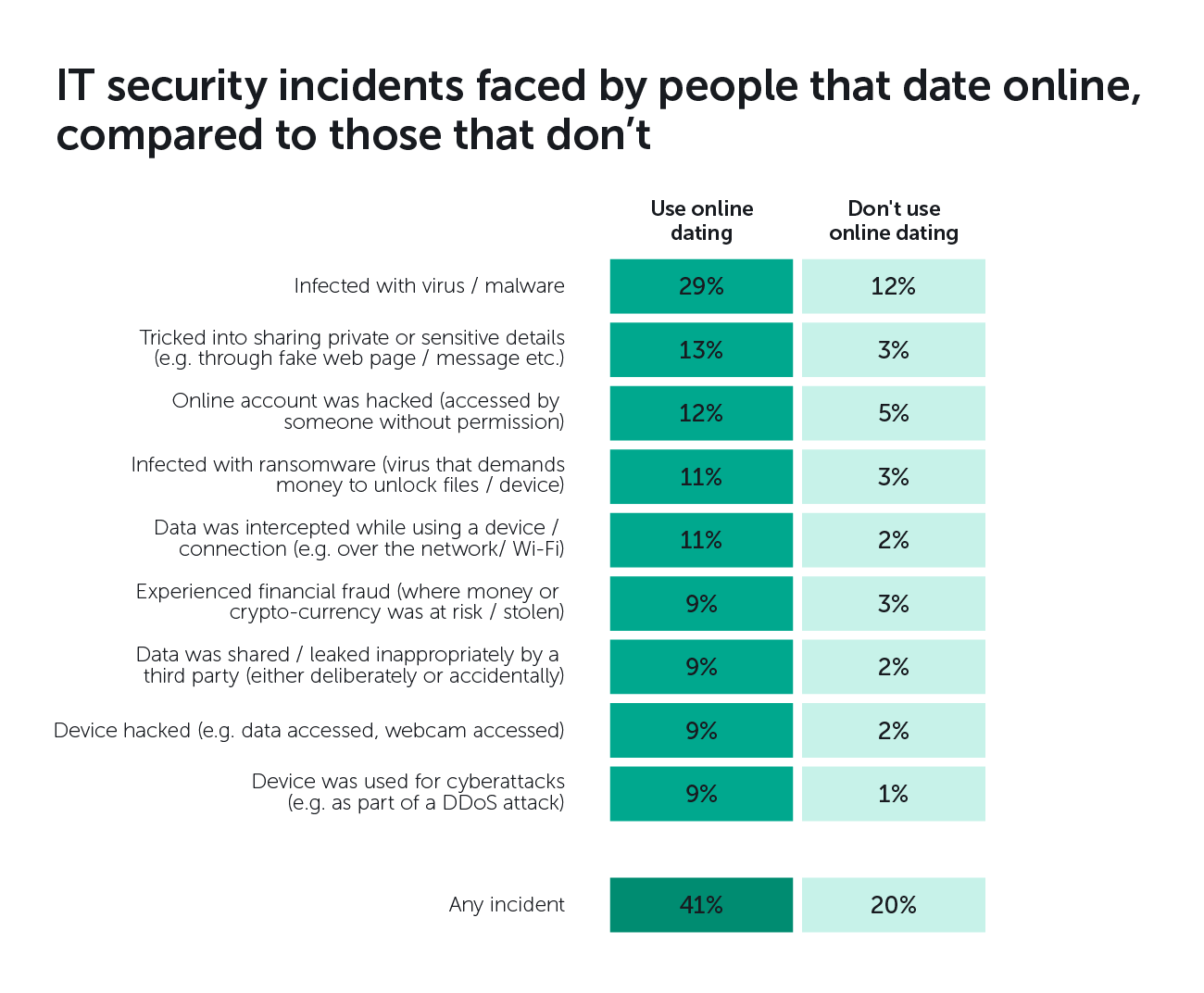
Always use protection
So why are people that date online, experiencing more IT security problems than people that don’t? One obvious answer already touched upon is the fact that people involved in online dating do spend a lot of time online, and therefore might naturally come across more dangers than people who don’t. However, the study also shows that people are not protecting themselves properly when they are dating online.
Looking at the protection methods people put in place, just 36% use strong passwords to keep their information secure and only 27% use a security solution to help, leaving the majority exposed to risk. Worryingly, 16% do nothing to protect themselves at all, because they do not see the risk.
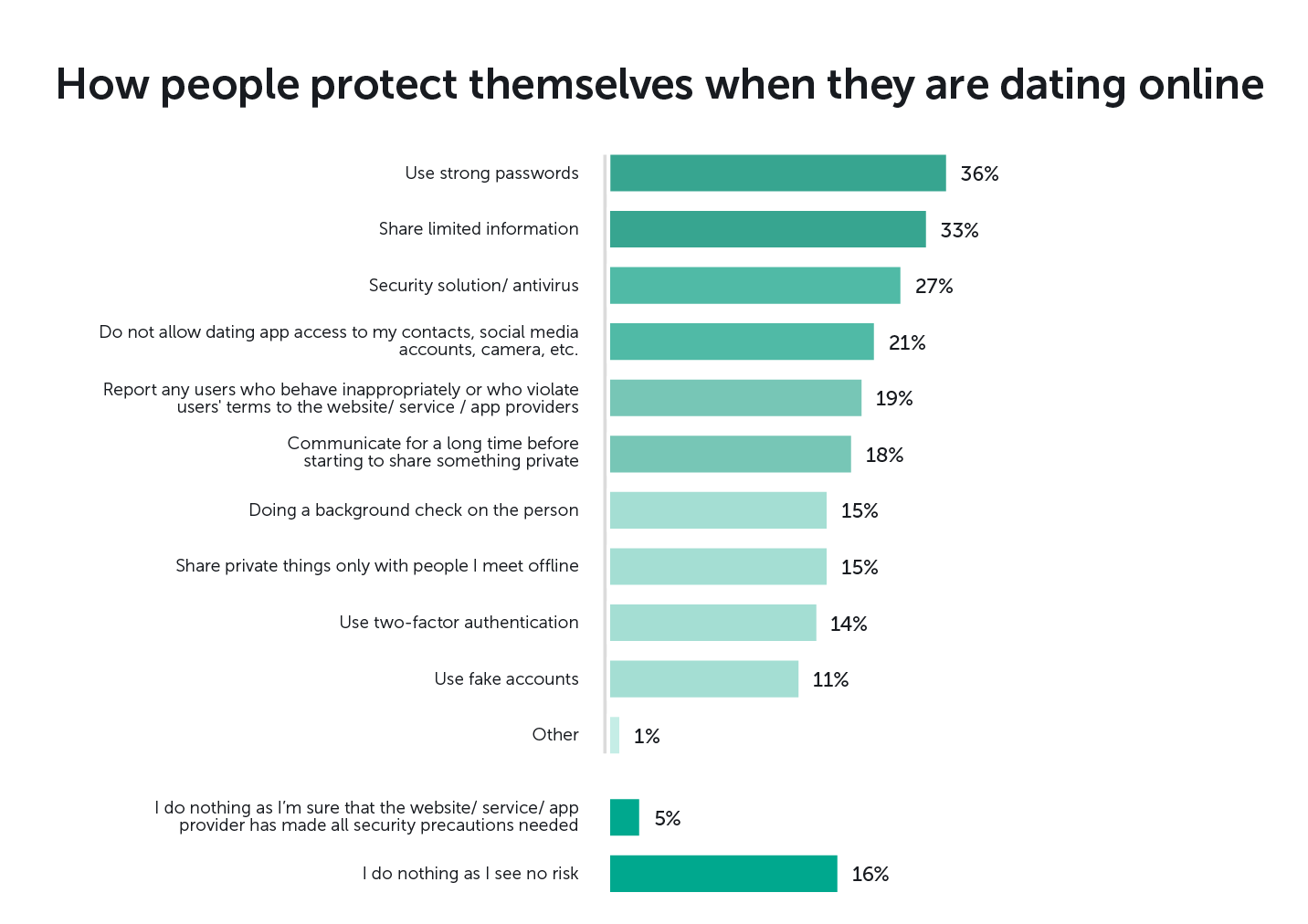
Despite not doing much to help themselves, 55% say that strong security and privacy practices are important to them when they choose an online dating website, service, or app, and only 12% do not know what security and privacy practices are. So, there is an awareness and certain level of concern about the dangers involved in online dating. This just needs to translate into action.
Conclusion: if you’re going to do it, do it safely
Today, people are time-poor, and we rely on our digital devices to help us manage our schedules, our busy lives, and how we interact with others. Digital devices act as a window to the rest of the world, including our relationships.
This is even more the case where online dating is concerned. This form of striking up new relationships is entirely dependent on our digital platforms or smart devices. People are, because of online dating, literally carrying their dates around with them in their pockets.
While this comes with a large amount of convenience, it also comes with its own risks. Like any form of dating, meeting up with strangers isn’t always plain-sailing and this is also the case online. Online dating, indeed, requires the exchange of a certain level of information which, if placed in the wrong hands, can be misused.
Needless to say, our study has found that people that take part in online dating, are likely to share sensitive information with people they don’t know, or have only just met. What’s more, they share this data quickly. They are also at heightened risk of experiencing an IT security-related problem such as having their data leaked or exposed in some way. Yet, they do little to protect themselves, with only one-in-three putting basic security measures in place such as using strong passwords or restraining themselves to sharing limited information about themselves online.
The boundary between online dating and the real world can very easily be blurred. Information about home addresses, once shared, can very quickly result in strangers turning up on doorsteps, personal information and sensitive photos can very easily turn into blackmail opportunities or put hacked accounts in the hands of cybercriminals.
Far from advising people to reduce their online dating activities, we simply would like to advise online daters to exercise caution, just like they would in the physical world. If you chose to date online, be careful not to click on unknown links that could be malicious, and try to avoid using insecure Wi-Fi hotspots where data can be intercepted by cybercriminals.
Furthermore, use protection in the form of a security solution and strong, hard-to-guess passwords, be savvy about how much data you give away and, importantly, look after the data you care about the most. That’s where Kaspersky Lab can help.

-